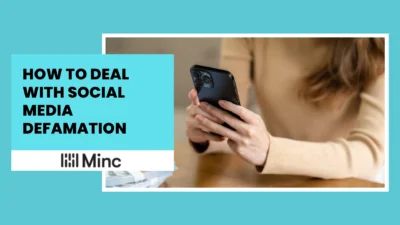
- Originally Published on July 18, 2024
How to Deal With Slander & Defamation on Facebook
Slander and defamation on Facebook are serious issues with real-world consequences. Whether you’ve been the victim of false and damaging posts, comments, messages, or videos, you’re likely feeling stressed and confused about your rights.
This guide explains exactly what constitutes slander vs. defamation on Facebook, the key legal elements you must prove, evidence to gather, and steps to fight back and get justice.
By arming you with this knowledge and action plan, our goal is to empower you to protect your reputation and hold wrongdoers accountable. Let’s dive in.
What is Considered Slander and Defamation on Facebook?
Defamation is a false statement presented as a fact that causes harm to someone and can take the form of both slander (spoken statements) and libel (written statements). To meet the legal definition of defamation, the false statement must be:
- Communicated to a third party (published)
- Cause material or reputational harm to the subject
- Made with at least negligence as to its truth
What makes Facebook unique is its collapse of context – posts, comments, and messages can instantly reach massive unintended audiences. A single false allegation can quickly spiral out of control and damage your relationships, career, and mental health.
Examples of Defamatory Facebook Posts
Example 1
“Mark Thompson, who works at ABC Company, is a convicted felon. He embezzled $50,000 from his previous employer, XYZ Corporation, in 2018.” In reality, Mark has never been convicted of a crime or embezzled money. This statement is false and damaging to Mark’s reputation, making it defamation.
Example 2
Sarah comments on a Facebook post: “I heard that the new Italian restaurant, Bella Roma, owned by Chef Lisa Rossi, was shut down by the Cleveland Health Department last week for serving contaminated meat that caused food poisoning in at least 15 customers.” The restaurant has never been shut down, and the claims about contaminated meat and food poisoning are untrue. This false statement could harm the restaurant’s business and Chef Lisa’s professional reputation, qualifying as defamation.
Example 3
Michael creates a Facebook post: “My former colleague, Emily Davis, was fired from her previous job at Acme Inc. for repeatedly coming to work drunk. She even showed up to a client meeting intoxicated and lost the company a major contract.” Emily has never been fired for being drunk at work, and the story about the client meeting is fabricated. This false accusation could damage her professional reputation and future employment prospects, making it defamation.
Example 4
Jessica shares a post on Facebook: “Dr. Robert Johnson, the pediatrician at ABC Clinic on Main Street, has been sexually abusing his young patients for years. My friend’s daughter was one of his victims, and she’s now suffering from severe trauma.” Dr. Johnson has never engaged in any sexual abuse, and the story about Jessica’s friend’s daughter is completely false. This false allegation could ruin his career and personal life, qualifying as defamation.
Examples of Negative Posts that Do NOT Qualify as Defamation
However, not all negative statements on Facebook qualify as defamation. Here are some examples of situations that don’t constitute defamation:
Example 1
Andrew posts on Facebook: “I didn’t like the service at Restaurant XYZ. The waiter was rude, and the food was cold.” While negative, this is likely an opinion based on Andrew’s personal experience and not a false statement of fact, so it doesn’t qualify as defamation.
Example 2
Olivia comments on a Facebook post: “I believe that Mayor Johnson’s policies are not in the best interest of our city.” This is Olivia’s opinion on a political matter and not a false statement of fact, so it doesn’t qualify as defamation.
Example 3
David posts on Facebook: “I heard a rumor that my co-worker, Rachel, is planning to quit her job.” While this statement may be untrue, David is not presenting it as a fact but rather as a rumor he heard, so it doesn’t qualify as defamation.
What Evidence Do I Need to Prove Facebook Slander?
Proving defamation on Facebook requires compelling evidence of key elements:
- The statement is materially false
- It was published to third parties (which is typically presumed with post social media
- The false allegations were made with negligent intent (or actual malice if about a public figure).
- It caused you harm
The most important evidence to gather includes the following:
- Screenshots of the defamatory posts, comments, messages, or videos. Be sure to capture the post content, date, and any likes, shares, and replies that show its reach. Don’t delay in preserving this evidence before the poster has a chance to delete it.
- Documentation of actual financial losses and emotional distress. This could include client contracts canceled due to defamation, proof of lost job opportunities, medical records, therapy bills, and a journal of your mental anguish.
- Evidence the statements are untrue. Gather all records, receipts, emails, witness statements, and other documentation that disproves the defamer’s allegations. Create a file undermining each false claim.
Remember, the burden of proof is on you as the plaintiff to present clear and convincing evidence meeting the three elements above. Preserve your evidence vigilantly since defamers often delete damaging content once confronted. If you wait too long, you may be unable to recover it.
What Legal Remedies Are Available?
Defamation on Facebook is generally a civil matter, not a criminal one. That means you can’t press charges or send someone to jail over it. However, you can sue the defamer in court and recover monetary damages for the harm they caused.
If you prove your defamation claim, the potential legal remedies include:
- Actual damages: Compensation for specific financial losses caused by the defamation, such as lost business, missed job opportunities, and medical expenses for emotional distress.
- Presumed damages: For certain statements so egregious that they obviously harm the plaintiff, damages can be presumed without proving specific losses. This often applies to allegations of criminal conduct, sexual misconduct, or professional unfitness.
- Punitive damages: If the defamer acted maliciously or with reckless disregard for the truth, you may receive additional damages to punish their conduct and deter others from similar behavior.
- Injunctions: The court can order the defamer to remove the offending statements from Facebook and bar them from repeating the false allegations. A defamation injunction can be permanent.
How Do I Sue Someone for Defamation on Facebook?
If you have gathered clear evidence of defamation on Facebook and the poster refuses to remove the content voluntarily, your main legal recourse is to file a defamation lawsuit. Here are the key steps in the litigation process:
- File a complaint: Your lawyer will file a legal complaint with the appropriate court, laying out your defamation claim and requested relief. It must be properly served on the defendant.
- Discovery: Both sides will exchange evidence and take depositions under oath. Your attorney will request records from Facebook if needed. If the defamer’s identity is unknown, you may subpoena the platform for account information.
- Pre-trial motions: The defendant may file motions to dismiss your complaint or have it stricken under Anti-SLAPP statutes if they believe your suit lacks merit or attempts to silence free speech. Your lawyer will need to defeat these motions.
- Settlement negotiation: Many defamation cases are settled before trial. Your lawyer will negotiate with the defendant for payment of damages, legal fees, and removal of the defamatory content.
- Trial: If a settlement isn’t reached, your case will proceed to trial, where a judge or jury will decide if the statements constitute defamation and what damages to award. Your lawyer will present your evidence and arguments.
What are the Defenses to Facebook Defamation Lawsuits?
In a defamation lawsuit, the defendant can raise several defenses to avoid liability. The primary defenses include:
- Truth: If the statements made about you are substantially true, it’s an absolute defense to defamation, even if they are embarrassing. You bear the burden of proving the statements are false.
- Opinion: Statements of pure opinion (as opposed to fact) generally can’t be defamatory. Defendants may claim their Facebook post was just an opinion. But if it implies false facts or relies on untrue information, it can still be defamatory.
- Consent: If you consented to the publication of the statements, you can’t later sue for defamation. Defendants may argue you agreed to have the information shared on Facebook.
- Privilege: Certain defendants have qualified or absolute privileges protecting them from defamation suits, such as testifying witnesses and government officials. This defense is narrow on Facebook.
Your attorney will need to anticipate and refute these defenses to prove the statements were false, unprivileged, factual assertions that harmed you.
What Makes Facebook Defamation Cases Challenging?
While defamation cases are always complex, Facebook presents some unique legal challenges:
- Identifying anonymous posters: Many defamatory statements are made by anonymous accounts or fake profiles. You may need a court order to uncover the poster’s identity and address.
- Establishing jurisdiction: Online defamation doesn’t have geographic boundaries. Jurisdictional rules vary, and you may have to sue in the defamer’s home state.
- CDA Section 230 Immunity: The Communications Decency Act shields Facebook from liability for content posted by third parties. You can’t sue Facebook itself in most cases, only the individual poster.
- Anti-SLAPP laws: Many states have anti-SLAPP (Strategic Lawsuit Against Public Participation) laws to deter frivolous defamation suits aimed at chilling free speech. Defendants may file special motions to dismiss under these statutes, which can delay your case and result in you owing legal fees if you lose.
- Difficulty calculating damages: Putting a dollar value on reputational harm is challenging. You need extensive documentation of your losses and solid expert testimony to support your damage request.
Because of these complexities, working with an attorney highly experienced in internet defamation litigation is crucial. They can help you navigate the legal hurdles, gather the right evidence, and build the strongest case.
How Can I Prevent Committing Accidental Defamation on Facebook?
Even if you don’t intend to spread false information, it’s important to be cautious about what you post on Facebook to avoid accidental defamation. Some best practices:
- Fact-check before posting: Always verify the truth of a statement before sharing it on Facebook, especially if it’s about another person. Don’t rely on rumor or innuendo.
- Make clear it’s opinion: If you are stating opinions, make it abundantly clear they are just your opinions rather than facts. Use phrases like “I believe,” “in my view,” or “it’s my opinion that.”
- Don’t repeat unproven allegations: Repeating a defamatory statement can expose you to liability, even if you name the original source. Share only information you know is true.
- Retract and correct mistakes: If you realize you posted something untrue, retract it immediately and publish a correction. This can reduce the harm and show a lack of malice.
Remember, you are legally responsible for the content you post on Facebook.
Defamation laws apply, even if you’re just acting out of emotion in the moment. Always pause and think before posting to save yourself legal trouble down the line.
Protect Your Reputation and Get Justice for Facebook Defamation
Combating slander and defamation on Facebook is challenging, but you have rights. By understanding the key legal concepts, gathering compelling evidence, and working with an experienced internet defamation attorney, you can hold wrongdoers accountable and obtain the removal of false content, financial damages, and vindication.
At Minc Law, we have extensive experience helping individuals and businesses fight back against Facebook defamation. We know how stressful and overwhelming it can be to face false attacks on your character online. That’s why we’re committed to providing aggressive, compassionate advocacy to help you get the justice you deserve.
Our team has a proven track record of success in internet defamation litigation. We’ve helped over 2,500 clients across the U.S. and around the world resolve their online defamation matters. We know how to swiftly identify anonymous posters, remove defamatory content, and recover maximum damages for our clients.
With the right strategy and representation, you can achieve the best outcome and protect your hard-earned reputation. Don’t let Facebook defamation control your narrative. Contact Minc Law today to take back the truth and get the justice you deserve.
To find out more about removing and responding to Facebook defamation, contact us for a free case evalutation by calling (216) 373-7706, speaking with a Chat representative, or filling out our contact form.
Get Your Free Case Review
Fill out the form below, and our team will review your information to discuss the best options for your situation.
This page has been peer-reviewed, fact-checked, and edited by qualified attorneys to ensure substantive accuracy and coverage.



